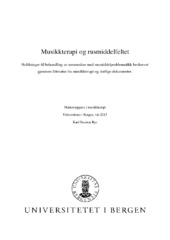Musikkterapi og rusmiddelfeltet. Holdninger til behandling av mennesker med rusmiddelproblematikk beskrevet gjennom litteratur fra musikkterapi og statlige dokumenter.
Master thesis
Published version
Permanent lenke
https://hdl.handle.net/1956/10361Utgivelsesdato
2015-05-15Metadata
Vis full innførselSamlinger
Sammendrag
Studien undersøker hvordan holdninger i litteratur om Norsk musikkterapi i rusomsorgen sammenfaller med offisielle dokumenter og retningslinjer som regulerer behandling av ruslidelser. Siden det eksisterer lite norsk forskning på musikkterapi innen rusomsorg suppleres dette med internasjonale studier. Diskusjonen tar for seg hvordan den medisinske modellen har innvirkning på hvordan vi måler psykoterapeutiske tilnærminger, stigmatiseringen denne pasientgruppen opplever og hvordan musikkterapi anvendes for å fremme ressurser og gi motivasjon. I litteraturgjennomgangen viser det seg at brukerperspektivet er et gjennomgående tema både i de offisielle dokumentene og i de typisk norske tilnærmingene til musikkterapi (samfunnsmusikkterapi, ressurs- og recoveryorientert musikkterapi.) Til tross for at psykoterapeutiske behandlingstilnærminger anbefales i de offisielle dokumentene for rusomsorg ser det ut til at vi fremdeles har et stykke å gå før dette er skikkelig implementert. Både musikkterapitekstene og de offisielle holdningene beveger seg i samme retning mot et mer recoverybasert perspektiv på helse og omsorg. This study aims to examine literature written on Norwegian music therapy in the field of drug addiction and the official guidelines and legislations that regulates the field of treatment for drug addiction to detect how attitudes towards treatment of drug addiction correlates. The scarse literature that describes the Norwegian context is supplied with international studies. The discussion evolves around the use of medical models to measure psychotherapy, the social stigma of persons with drug addiction and the use of music therapy to focus on resources and to motivate the client. The review reveals that the views and experience of the service users is an important theme in both the official documents and in many of the most common Norwegian approaches (community music therapy, recource-oriented music therapy and recovery- based music therapy), but, even though psychotheraputic support was recommended in the official documents, it still seems to require further steps towards proper implementation. Both music therapy and the official attitudes towards treatment are moving towards a more recovery-based health care perspective.
